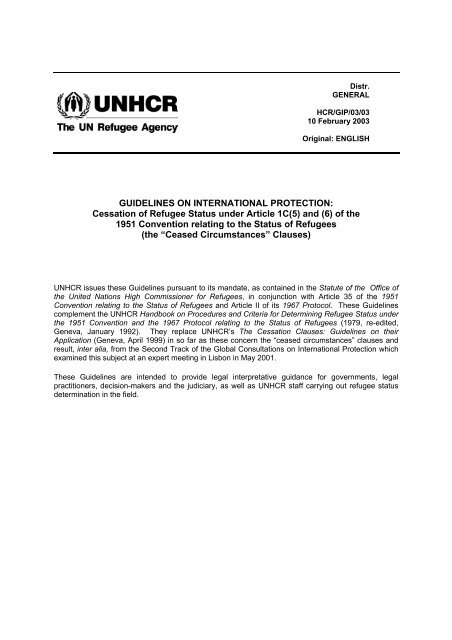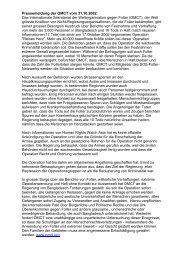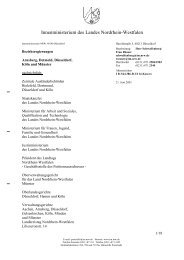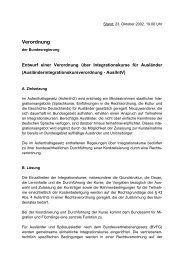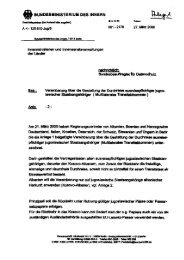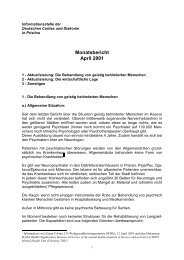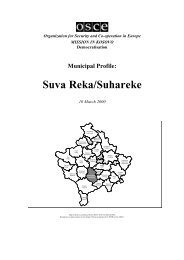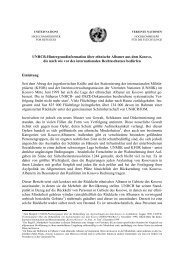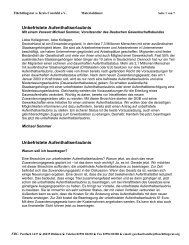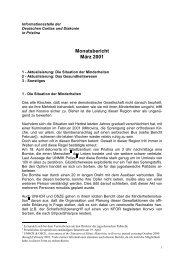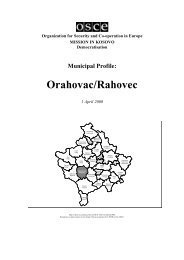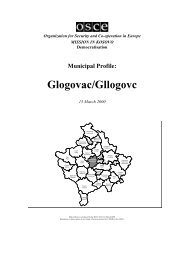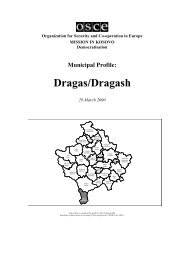Cessation of Refugee Status under Article 1C(5) and (6)
Cessation of Refugee Status under Article 1C(5) and (6)
Cessation of Refugee Status under Article 1C(5) and (6)
Create successful ePaper yourself
Turn your PDF publications into a flip-book with our unique Google optimized e-Paper software.
Distr.<br />
GENERAL<br />
HCR/GIP/03/03<br />
10 February 2003<br />
Original: ENGLISH<br />
GUIDELINES ON INTERNATIONAL PROTECTION:<br />
<strong>Cessation</strong> <strong>of</strong> <strong>Refugee</strong> <strong>Status</strong> <strong>under</strong> <strong>Article</strong> <strong>1C</strong>(5) <strong>and</strong> (6) <strong>of</strong> the<br />
1951 Convention relating to the <strong>Status</strong> <strong>of</strong> <strong>Refugee</strong>s<br />
(the “Ceased Circumstances” Clauses)<br />
UNHCR issues these Guidelines pursuant to its m<strong>and</strong>ate, as contained in the Statute <strong>of</strong> the Office <strong>of</strong><br />
the United Nations High Commissioner for <strong>Refugee</strong>s, in conjunction with <strong>Article</strong> 35 <strong>of</strong> the 1951<br />
Convention relating to the <strong>Status</strong> <strong>of</strong> <strong>Refugee</strong>s <strong>and</strong> <strong>Article</strong> II <strong>of</strong> its 1967 Protocol. These Guidelines<br />
complement the UNHCR H<strong>and</strong>book on Procedures <strong>and</strong> Criteria for Determining <strong>Refugee</strong> <strong>Status</strong> <strong>under</strong><br />
the 1951 Convention <strong>and</strong> the 1967 Protocol relating to the <strong>Status</strong> <strong>of</strong> <strong>Refugee</strong>s (1979, re-edited,<br />
Geneva, January 1992). They replace UNHCR’s The <strong>Cessation</strong> Clauses: Guidelines on their<br />
Application (Geneva, April 1999) in so far as these concern the “ceased circumstances” clauses <strong>and</strong><br />
result, inter alia, from the Second Track <strong>of</strong> the Global Consultations on International Protection which<br />
examined this subject at an expert meeting in Lisbon in May 2001.<br />
These Guidelines are intended to provide legal interpretative guidance for governments, legal<br />
practitioners, decision-makers <strong>and</strong> the judiciary, as well as UNHCR staff carrying out refugee status<br />
determination in the field.
I. INTRODUCTION<br />
<strong>Cessation</strong> <strong>of</strong> <strong>Refugee</strong> <strong>Status</strong> <strong>under</strong> <strong>Article</strong> <strong>1C</strong>(5) <strong>and</strong> (6) <strong>of</strong> the<br />
1951 Convention relating to the <strong>Status</strong> <strong>of</strong> <strong>Refugee</strong>s<br />
(the “Ceased Circumstances” Clauses)<br />
1. The 1951 Convention relating to the <strong>Status</strong> <strong>of</strong> <strong>Refugee</strong>s (hereinafter “1951 Convention”)<br />
recognises that refugee status ends <strong>under</strong> certain clearly defined conditions. This means that once an<br />
individual is determined to be a refugee, their status is maintained unless they fall within the terms <strong>of</strong><br />
the cessation clauses or their status is cancelled or revoked. 1 Under <strong>Article</strong> <strong>1C</strong> <strong>of</strong> the 1951<br />
Convention, refugee status may cease either through the actions <strong>of</strong> the refugee (contained in subparagraphs<br />
1 to 4), such as by re-establishment in his or her country <strong>of</strong> origin, 2 or through fundamental<br />
changes in the objective circumstances in the country <strong>of</strong> origin upon which refugee status was based<br />
(sub-paragraphs 5 <strong>and</strong> 6). The latter are commonly referred to as the “ceased circumstances” or<br />
“general cessation” clauses. These Guidelines are concerned only with the latter provisions.<br />
2. <strong>Article</strong> <strong>1C</strong>(5) <strong>and</strong> (6) provides that the 1951 Convention shall cease to apply to any person falling<br />
<strong>under</strong> the terms <strong>of</strong> <strong>Article</strong> 1(A) if:<br />
(5) He can no longer, because the circumstances in connexion with which he has been<br />
recognized as a refugee have ceased to exist, continue to refuse to avail himself <strong>of</strong> the<br />
protection <strong>of</strong> the country <strong>of</strong> his nationality;<br />
Provided that this paragraph shall not apply to a refugee falling <strong>under</strong> section A(1) <strong>of</strong><br />
this <strong>Article</strong> who is able to invoke compelling reasons arising out <strong>of</strong> previous<br />
persecution for refusing to avail himself <strong>of</strong> the protection <strong>of</strong> the country <strong>of</strong> nationality;<br />
(6) Being a person who has no nationality he is, because the circumstances in connexion<br />
with which he has been recognized as a refugee have ceased to exist, able to return<br />
to the country <strong>of</strong> his former habitual residence;<br />
Provided that this paragraph shall not apply to a refugee falling <strong>under</strong> section A(1) <strong>of</strong><br />
this <strong>Article</strong> who is able to invoke compelling reasons arising out <strong>of</strong> previous<br />
persecution for refusing to return to the country <strong>of</strong> his former habitual residence.<br />
3. UNHCR or States may issue formal declarations <strong>of</strong> general cessation <strong>of</strong> refugee status for a<br />
particular refugee caseload. 3 UNHCR has such competence <strong>under</strong> <strong>Article</strong> 6A <strong>of</strong> the Statute <strong>of</strong> the<br />
Office <strong>of</strong> the High Commissioner for <strong>Refugee</strong>s in conjunction with <strong>Article</strong> <strong>1C</strong> <strong>of</strong> the 1951 Convention.<br />
Due to the fact that large numbers <strong>of</strong> refugees voluntarily repatriate without an <strong>of</strong>ficial declaration that<br />
conditions in their countries <strong>of</strong> origin no longer justify international protection, declarations are<br />
infrequent. Furthermore, many States Parties grant permanent residence status to refugees in their<br />
territories after several years, eventually leading to their integration <strong>and</strong> naturalisation. Similarly,<br />
cessation determinations on an individual basis as well as periodic reviews are rare, in recognition <strong>of</strong><br />
the “need to respect a basic degree <strong>of</strong> stability for individual refugees”. 4<br />
4. The grounds identified in the 1951 Convention are exhaustive; that is, no additional grounds would<br />
justify a conclusion that international protection is no longer required. 5 Operation <strong>of</strong> the cessation<br />
1 See, UNHCR, H<strong>and</strong>book on Procedures <strong>and</strong> Criteria for Determining <strong>Refugee</strong> <strong>Status</strong>, (hereinafter “UNHCR<br />
H<strong>and</strong>book”) (1979, Geneva, re-edited Jan. 1992), para. 112. For distinction between cessation <strong>and</strong><br />
cancellation/revocation see, para. 4 below.<br />
2 In these Guidelines, “country <strong>of</strong> origin” is <strong>under</strong>stood to cover both the country <strong>of</strong> nationality <strong>and</strong> the country <strong>of</strong><br />
former habitual residence, the latter in relation to refugees who are stateless. For more on <strong>Article</strong> <strong>1C</strong>(1–4), see<br />
UNHCR, “The <strong>Cessation</strong> Clauses: Guidelines on their Application”, April 1999.<br />
3 See, for example, UNHCR’s formal declarations <strong>of</strong> general cessation: “Applicability <strong>of</strong> the <strong>Cessation</strong> Clauses to<br />
<strong>Refugee</strong>s from Pol<strong>and</strong>, Czechoslovakia <strong>and</strong> Hungary”, 15 Nov. 1991, “Applicability <strong>of</strong> <strong>Cessation</strong> Clauses to<br />
<strong>Refugee</strong>s from Chile”, 28 March 1994, “Applicability <strong>of</strong> the <strong>Cessation</strong> Clauses to <strong>Refugee</strong>s from the Republics <strong>of</strong><br />
Malawi <strong>and</strong> Mozambique”, 31 Dec. 1996, “Applicability <strong>of</strong> the <strong>Cessation</strong> Clauses to <strong>Refugee</strong>s from Bulgaria <strong>and</strong><br />
Romania”, 1 Oct. 1997, “Applicability <strong>of</strong> the Ceased Circumstances; <strong>Cessation</strong> Clauses to pre-1991 refugees from<br />
Ethiopia”, 23 Sept. 1999, <strong>and</strong> “Declaration <strong>of</strong> <strong>Cessation</strong> – Timor Leste”, 20 December 2002.<br />
4 “Summary Conclusions on <strong>Cessation</strong> <strong>of</strong> <strong>Refugee</strong> <strong>Status</strong>, Global Consultations on International Protection,<br />
Lisbon Expert Roundtable”, May 2001, no. B (17). See also, UNHCR H<strong>and</strong>book, para. 135.<br />
5 See, amongst others, UNHCR H<strong>and</strong>book, para. 116.<br />
2
clauses should, in addition, be distinguished from other decisions that terminate refugee status.<br />
<strong>Cessation</strong> differs from cancellation <strong>of</strong> refugee status. Cancellation is based on a determination that an<br />
individual should not have been recognised as a refugee in the first place. This is, for instance, so<br />
where it is established that there was a misrepresentation <strong>of</strong> material facts essential to the outcome <strong>of</strong><br />
the determination process or that one <strong>of</strong> the exclusion clauses would have been applicable had all the<br />
relevant facts been known. <strong>Cessation</strong> also differs from revocation, which may take place if a refugee<br />
subsequently engages in conduct coming within the scope <strong>of</strong> <strong>Article</strong> 1F(a) or 1F(c).<br />
II. SUBSTANTIVE ANALYSIS<br />
5. The following framework for substantive analysis is drawn from the terms <strong>of</strong> <strong>Article</strong> <strong>1C</strong>(5) <strong>and</strong><br />
<strong>1C</strong>(6) <strong>of</strong> the 1951 Convention <strong>and</strong> takes into account Executive Committee Conclusion No. 69,<br />
subsequent legal developments, <strong>and</strong> State practice.<br />
A. GENERAL CONSIDERATIONS<br />
6. When interpreting the cessation clauses, it is important to bear in mind the broad durable solutions<br />
context <strong>of</strong> refugee protection informing the object <strong>and</strong> purpose <strong>of</strong> these clauses. Numerous Executive<br />
Committee Conclusions affirm that the 1951 Convention <strong>and</strong> principles <strong>of</strong> refugee protection look to<br />
durable solutions for refugees. 6 Accordingly, cessation practices should be developed in a manner<br />
consistent with the goal <strong>of</strong> durable solutions. <strong>Cessation</strong> should therefore not result in persons residing<br />
in a host State with an uncertain status. It should not result either in persons being compelled to return<br />
to a volatile situation, as this would <strong>under</strong>mine the likelihood <strong>of</strong> a durable solution <strong>and</strong> could also<br />
cause additional or renewed instability in an otherwise improving situation, thus risking future refugee<br />
flows. Acknowledging these considerations ensures refugees do not face involuntary return to<br />
situations that might again produce flight <strong>and</strong> a need for refugee status. It supports the principle that<br />
conditions within the country <strong>of</strong> origin must have changed in a pr<strong>of</strong>ound <strong>and</strong> enduring manner before<br />
cessation can be applied.<br />
7. <strong>Cessation</strong> <strong>under</strong> <strong>Article</strong> <strong>1C</strong>(5) <strong>and</strong> <strong>1C</strong>(6) does not require the consent <strong>of</strong> or a voluntary act by the<br />
refugee. <strong>Cessation</strong> <strong>of</strong> refugee status terminates rights that accompany that status. It may bring about<br />
the return <strong>of</strong> the person to the country <strong>of</strong> origin <strong>and</strong> may thus break ties to family, social networks <strong>and</strong><br />
employment in the community in which the refugee has become established. As a result, a premature<br />
or insufficiently grounded application <strong>of</strong> the ceased circumstances clauses can have serious<br />
consequences. It is therefore appropriate to interpret the clauses strictly <strong>and</strong> to ensure that<br />
procedures for determining general cessation are fair, clear, <strong>and</strong> transparent.<br />
B. ASSESSMENT OF CHANGE OF CIRCUMSTANCES IN THE COUNTRY OF ORIGIN<br />
8. <strong>Article</strong> <strong>1C</strong>(5) <strong>and</strong> (6) provides for the cessation <strong>of</strong> a person’s refugee status where “the<br />
circumstances in connexion with which he [or she] has been recognized as a refugee have ceased to<br />
exist”. To assist assessment <strong>of</strong> how <strong>and</strong> to what extent conditions in the country <strong>of</strong> origin must have<br />
changed before these “ceased circumstances” clauses can be invoked, UNHCR’s Executive<br />
Committee has developed guidance in the form <strong>of</strong> Executive Committee Conclusion No. 69 (XLIII)<br />
(1992), which reads in part:<br />
[I]n taking any decision on application <strong>of</strong> the cessation clauses based on “ceased circumstances”,<br />
States must carefully assess the fundamental character <strong>of</strong> the changes in the country <strong>of</strong><br />
nationality or origin, including the general human rights situation, as well as the particular cause <strong>of</strong><br />
fear <strong>of</strong> persecution, in order to make sure in an objective <strong>and</strong> verifiable way that the situation<br />
which justified the granting <strong>of</strong> refugee status has ceased to exist.<br />
... [A]n essential element in such assessment by States is the fundamental, stable <strong>and</strong> durable<br />
character <strong>of</strong> the changes, making use <strong>of</strong> appropriate information available in this respect, inter<br />
alia, from relevant specialized bodies, including particularly UNHCR.<br />
6 See, e.g., Executive Committee Conclusions No. 29 (XXXIV) (1983), No. 50 (XXXIX) (1988), No. 58 (XL) (1989),<br />
No. 79 (XLVII) (1996), No. 81 (XLVIII) (1997), No. 85 (XLIX) (1998), No. 87 (L) (1999), No. 89 (L) (2000), <strong>and</strong> No.<br />
90 (LII) (2001).<br />
3
9. Key elements relevant to assessment <strong>of</strong> the extent <strong>and</strong> durability <strong>of</strong> change required before it can<br />
be said that the circumstances in connection with which refugee status was recognised have ceased<br />
to exist are outlined below.<br />
The fundamental character <strong>of</strong> change<br />
10. For cessation to apply, the changes need to be <strong>of</strong> a fundamental nature, such that the refugee<br />
“can no longer … continue to refuse to avail himself <strong>of</strong> the protection <strong>of</strong> the country <strong>of</strong> his nationality”<br />
(<strong>Article</strong> <strong>1C</strong>(5)) or, if he has no nationality, is “able to return to the country <strong>of</strong> his former habitual<br />
residence” (<strong>Article</strong> <strong>1C</strong>(6)). <strong>Cessation</strong> based on “ceased circumstances” therefore only comes into play<br />
when changes have taken place which address the causes <strong>of</strong> displacement which led to the<br />
recognition <strong>of</strong> refugee status.<br />
11. Where indeed a “particular cause <strong>of</strong> fear <strong>of</strong> persecution” 7 has been identified, the elimination <strong>of</strong><br />
that cause carries more weight than a change in other factors. Often, however, circumstances in a<br />
country are inter-linked, be these armed conflict, serious violations <strong>of</strong> human rights, severe<br />
discrimination against minorities, or the absence <strong>of</strong> good governance, with the result that resolution <strong>of</strong><br />
the one will tend to lead to an improvement in others. All relevant factors must therefore be taken into<br />
consideration. An end to hostilities, a complete political change <strong>and</strong> return to a situation <strong>of</strong> peace <strong>and</strong><br />
stability remain the most typical situation in which <strong>Article</strong> <strong>1C</strong>(5) or (6) applies.<br />
12. Large-scale spontaneous repatriation <strong>of</strong> refugees may be an indicator <strong>of</strong> changes that are<br />
occurring or have occurred in the country <strong>of</strong> origin. Where the return <strong>of</strong> former refugees would be likely<br />
to generate fresh tension in the country <strong>of</strong> origin, however, this itself could signal an absence <strong>of</strong><br />
effective, fundamental change. Similarly, where the particular circumstances leading to flight or to nonreturn<br />
have changed, only to be replaced by different circumstances which may also give rise to<br />
refugee status, <strong>Article</strong> <strong>1C</strong>(5) or (6) cannot be invoked.<br />
The enduring nature <strong>of</strong> change<br />
13. Developments which would appear to evidence significant <strong>and</strong> pr<strong>of</strong>ound changes should be given<br />
time to consolidate before any decision on cessation is made. Occasionally, an evaluation as to<br />
whether fundamental changes have taken place on a durable basis can be made after a relatively<br />
short time has elapsed. This is so in situations where, for example, the changes are peaceful <strong>and</strong> take<br />
place <strong>under</strong> a constitutional process, where there are free <strong>and</strong> fair elections with a real change <strong>of</strong><br />
government committed to respecting fundamental human rights, <strong>and</strong> where there is relative political<br />
<strong>and</strong> economic stability in the country.<br />
14. A longer period <strong>of</strong> time will need to have elapsed before the durability <strong>of</strong> change can be tested<br />
where the changes have taken place violently, for instance, through the overthrow <strong>of</strong> a regime. Under<br />
the latter circumstances, the human rights situation needs to be especially carefully assessed. The<br />
process <strong>of</strong> national reconstruction must be given sufficient time to take hold <strong>and</strong> any peace<br />
arrangements with opposing militant groups must be carefully monitored. This is particularly relevant<br />
after conflicts involving different ethnic groups, since progress towards genuine reconciliation has<br />
<strong>of</strong>ten proven difficult in such cases. Unless national reconciliation clearly starts to take root <strong>and</strong> real<br />
peace is restored, political changes which have occurred may not be firmly established.<br />
Restoration <strong>of</strong> protection<br />
15. In determining whether circumstances have changed so as to justify cessation <strong>under</strong> <strong>Article</strong> <strong>1C</strong>(5)<br />
or (6), another crucial question is whether the refugee can effectively re-avail him- or herself <strong>of</strong> the<br />
protection <strong>of</strong> his or her own country. 8 Such protection must therefore be effective <strong>and</strong> available. It<br />
requires more than mere physical security or safety. It needs to include the existence <strong>of</strong> a functioning<br />
government <strong>and</strong> basic administrative structures, as evidenced for instance through a functioning<br />
system <strong>of</strong> law <strong>and</strong> justice, as well as the existence <strong>of</strong> adequate infrastructure to enable residents to<br />
exercise their rights, including their right to a basic livelihood.<br />
7 See Executive Committee Conclusion No. 69 (XLIII) (1992), para. a.<br />
8 See Art. 12(4) <strong>of</strong> the 1966 International Covenant on Civil <strong>and</strong> Political Rights declaring: “No one shall be<br />
arbitrarily deprived <strong>of</strong> the right to enter his own country” <strong>and</strong> Human Rights Committee, General Comment No. 27,<br />
<strong>Article</strong> 12 (freedom <strong>of</strong> movement), 1999.<br />
4
16. An important indicator in this respect is the general human rights situation in the country. Factors<br />
which have special weight for its assessment are the level <strong>of</strong> democratic development in the country,<br />
including the holding <strong>of</strong> free <strong>and</strong> fair elections, adherence to international human rights instruments,<br />
<strong>and</strong> access for independent national or international organisations freely to verify respect for human<br />
rights. There is no requirement that the st<strong>and</strong>ards <strong>of</strong> human rights achieved must be exemplary. What<br />
matters is that significant improvements have been made, as illustrated at least by respect for the right<br />
to life <strong>and</strong> liberty <strong>and</strong> the prohibition <strong>of</strong> torture; marked progress in establishing an independent<br />
judiciary, fair trials <strong>and</strong> access to courts: as well as protection amongst others <strong>of</strong> the fundamental<br />
rights to freedom <strong>of</strong> expression, association <strong>and</strong> religion. Important, more specific indicators include<br />
declarations <strong>of</strong> amnesties, the repeal <strong>of</strong> oppressive laws, <strong>and</strong> the dismantling <strong>of</strong> former security<br />
services.<br />
C. PARTIAL CESSATION<br />
17. The 1951 Convention does not preclude cessation declarations for distinct sub-groups <strong>of</strong> a<br />
general refugee population from a specific country, for instance, for refugees fleeing a particular<br />
regime but not for those fleeing after that regime was deposed. 9 In contrast, changes in the refugee’s<br />
country <strong>of</strong> origin affecting only part <strong>of</strong> the territory should not, in principle, lead to cessation <strong>of</strong> refugee<br />
status. <strong>Refugee</strong> status can only come to an end if the basis for persecution is removed without the<br />
precondition that the refugee has to return to specific safe parts <strong>of</strong> the country in order to be free from<br />
persecution. Also, not being able to move or to establish oneself freely in the country <strong>of</strong> origin would<br />
indicate that the changes have not been fundamental.<br />
D. INDIVIDUAL CESSATION<br />
18. A strict interpretation <strong>of</strong> <strong>Article</strong> <strong>1C</strong>(5) <strong>and</strong> (6) would allow their application on an individual basis. It<br />
reads: “The Convention shall cease to apply to any person [if] ... [h]e can no longer, because the<br />
circumstances in connexion with which he has been recognized as a refugee have ceased to exist,<br />
continue to refuse to avail himself <strong>of</strong> the protection” <strong>of</strong> his country <strong>of</strong> origin (emphasis supplied). Yet<br />
<strong>Article</strong> <strong>1C</strong>(5) <strong>and</strong> (6) have rarely been invoked in individual cases. States have not generally<br />
<strong>under</strong>taken periodic reviews <strong>of</strong> individual cases on the basis <strong>of</strong> fundamental changes in the country <strong>of</strong><br />
origin. These practices acknowledge that a refugee’s sense <strong>of</strong> stability should be preserved as much<br />
as possible. They are also consistent with <strong>Article</strong> 34 <strong>of</strong> the 1951 Convention, which urges States “as<br />
far as possible [to] facilitate the assimilation <strong>and</strong> naturalization <strong>of</strong> refugees”. Where the cessation<br />
clauses are applied on an individual basis, it should not be done for the purposes <strong>of</strong> a re-hearing de<br />
novo.<br />
E. EXCEPTIONS TO CESSATION<br />
Continued international protection needs<br />
19. Even when circumstances have generally changed to such an extent that refugee status would no<br />
longer be necessary, there may always be the specific circumstances <strong>of</strong> individual cases that may<br />
warrant continued international protection. It has therefore been a general principle that all refugees<br />
affected by general cessation must have the possibility, upon request, to have such application in their<br />
cases reconsidered on international protection grounds relevant to their individual case. 10<br />
“Compelling reasons”<br />
20. Both <strong>Article</strong> <strong>1C</strong>(5) <strong>and</strong> (6) contain an exception to the cessation provision, allowing a refugee to<br />
invoke “compelling reasons arising out <strong>of</strong> previous persecution” for refusing to re-avail himself or<br />
herself <strong>of</strong> the protection <strong>of</strong> the country <strong>of</strong> origin. This exception is intended to cover cases where<br />
refugees, or their family members, have suffered atrocious forms <strong>of</strong> persecution <strong>and</strong> therefore cannot<br />
be expected to return to the country <strong>of</strong> origin or former habitual residence. 11 This might, for example,<br />
include “ex-camp or prison detainees, survivors or witnesses <strong>of</strong> violence against family members,<br />
including sexual violence, as well as severely traumatised persons. It is presumed that such persons<br />
9 This approach has been taken by UNHCR on one occasion.<br />
10 Executive Committee, Conclusion No. 69 (XLIII) (1992), para. d.<br />
11 See amongst others, UNHCR H<strong>and</strong>book, para. 136.<br />
5
have suffered grave persecution, including at the h<strong>and</strong>s <strong>of</strong> elements <strong>of</strong> the local population, <strong>and</strong><br />
cannot reasonably be expected to return.” 12 Children should also be given special consideration in<br />
this regard, as they may <strong>of</strong>ten be able to invoke “compelling reasons” for refusing to return to their<br />
country <strong>of</strong> origin.<br />
21. Application <strong>of</strong> the “compelling reasons” exception is interpreted to extend beyond the actual words<br />
<strong>of</strong> the provision to apply to <strong>Article</strong> 1A(2) refugees. This reflects a general humanitarian principle that is<br />
now well-grounded in State practice. 13<br />
Long-term residents<br />
22. In addition, the Executive Committee, in Conclusion No. 69, recommends that States consider<br />
“appropriate arrangements” for persons “who cannot be expected to leave the country <strong>of</strong> asylum, due<br />
to a long stay in that country resulting in strong family, social <strong>and</strong> economic links”. In such situations,<br />
countries <strong>of</strong> asylum are encouraged to provide, <strong>and</strong> <strong>of</strong>ten do provide, the individuals concerned with<br />
an alternative residence status, which retains previously acquired rights, though in some instances<br />
with refugee status being withdrawn. Adopting this approach for long-settled refugees is not required<br />
by the 1951 Convention per se, but it is consistent with the instrument’s broad humanitarian purpose<br />
<strong>and</strong> with respect for previously acquired rights, as set out in the aforementioned Executive Committee<br />
Conclusion No. 69 <strong>and</strong> international human rights law st<strong>and</strong>ards. 14<br />
F. CESSATION AND MASS INFLUX<br />
Prima facie group determinations <strong>under</strong> the 1951 Convention<br />
23. Situations <strong>of</strong> mass influx frequently involve groups <strong>of</strong> persons acknowledged as refugees on a<br />
group basis because <strong>of</strong> the readily apparent <strong>and</strong> objective reasons for flight <strong>and</strong> circumstances in the<br />
country <strong>of</strong> origin. The immediate impracticality <strong>of</strong> individual status determinations has led to use <strong>of</strong> a<br />
prima facie refugee designation or acceptance for the group. 15 For such groups, the general principles<br />
described for cessation are applicable.<br />
Temporary protection in mass influx situations that include persons covered by the 1951<br />
Convention<br />
24. Some States have developed “temporary protection” schemes 16 <strong>under</strong> which assistance <strong>and</strong><br />
protection against refoulement have been extended on a group basis, without either a determination <strong>of</strong><br />
prima facie refugee status for the group or individual status determinations for members <strong>of</strong> the group.<br />
Even though the cessation doctrine does not formally come into play, this form <strong>of</strong> protection is built<br />
upon the 1951 Convention framework <strong>and</strong> members <strong>of</strong> the group may well be or include refugees<br />
<strong>under</strong> the Convention. Decisions by States to withdraw temporary protection should therefore be<br />
preceded by a thorough evaluation <strong>of</strong> the changes in the country <strong>of</strong> origin. Such decisions should also<br />
be accompanied by an opportunity for those unwilling to return <strong>and</strong> requesting international protection<br />
to have access to an asylum procedure. In this context, it is also appropriate for States to provide<br />
exceptions for individuals with “compelling reasons” arising out <strong>of</strong> prior persecution.<br />
III. PROCEDURAL ISSUES<br />
25. As mentioned earlier, a declaration <strong>of</strong> general cessation has potentially serious consequences for<br />
recognised refugees. It acknowledges loss <strong>of</strong> refugee status <strong>and</strong> the rights that accompany that<br />
status, <strong>and</strong> it may contemplate the return <strong>of</strong> persons to their countries <strong>of</strong> origin. Thus, the following<br />
procedural aspects should be observed:<br />
12 See UNHCR <strong>and</strong> UNHCHR Study, “Daunting Prospects Minority Women: Obstacles to their Return <strong>and</strong><br />
Integration”, Sarajevo, Bosnia <strong>and</strong> Herzegovina, April 2000.<br />
13 See generally, J. Fitzpatrick <strong>and</strong> R. Bonoan, “<strong>Cessation</strong> <strong>of</strong> <strong>Refugee</strong> Protection” in <strong>Refugee</strong> Protection in<br />
International Law: UNHCR’s Global Consultations on International Protection, eds E. Feller, V. Türk <strong>and</strong> F.<br />
Nicholson, (Cambridge University Press, 2003 forthcoming).<br />
14 See e.g., above footnote 8.<br />
15 See “Protection <strong>of</strong> <strong>Refugee</strong>s in Mass Influx Situations: Overall Protection Framework, Global Consultations on<br />
International Protection”, EC/GC/01/4, 19 Feb. 2001.<br />
16 See, e.g., the European Union Directive on Temporary Protection, 2001/55/EC, 20 July 2001.<br />
6
General considerations<br />
(i) In making an assessment <strong>of</strong> the country <strong>of</strong> origin, States <strong>and</strong> UNHCR must “make sure in an<br />
objective <strong>and</strong> verifiable way that the situation which justified the granting <strong>of</strong> refugee status has<br />
ceased to exist”. 17 As noted above, this assessment should include consideration <strong>of</strong> a range <strong>of</strong><br />
factors, including the general human rights situation.<br />
(ii) The burden rests on the country <strong>of</strong> asylum to demonstrate that there has been a fundamental,<br />
stable <strong>and</strong> durable change in the country <strong>of</strong> origin <strong>and</strong> that invocation <strong>of</strong> <strong>Article</strong> <strong>1C</strong>(5) or (6) is<br />
appropriate. There may be instances where certain groups should be excluded from the<br />
application <strong>of</strong> general cessation because they remain at risk <strong>of</strong> persecution.<br />
(iii) It is important that both the declaration process <strong>and</strong> implementation plans be consultative <strong>and</strong><br />
transparent, involving in particular UNHCR, given its supervisory role. 18 NGOs <strong>and</strong> refugees<br />
should also be included in this consultative process. “Go <strong>and</strong> see” visits to the country <strong>of</strong> origin<br />
could, where feasible, be facilitated to examine conditions there, as well as an examination <strong>of</strong><br />
the situation <strong>of</strong> refugees who have already returned voluntarily.<br />
(iv) General cessation declarations should be made public.<br />
(v) Counselling <strong>of</strong> refugees, information sharing <strong>and</strong>, if necessary, the provision <strong>of</strong> assistance to<br />
returnees are critical to the successful implementation <strong>of</strong> general cessation.<br />
(vi) Procedures operationalising a declaration <strong>of</strong> cessation need to be carried out in a flexible,<br />
phased manner, particularly in developing countries hosting large numbers <strong>of</strong> refugees. There<br />
needs to be a certain time lapse between the moment <strong>of</strong> declaration <strong>and</strong> implementation,<br />
allowing for preparations for return <strong>and</strong> arrangements for long-term residents with acquired<br />
rights.<br />
(vii) Noting the potential impact <strong>of</strong> a general cessation declaration on refugees <strong>and</strong> their families,<br />
they should be given an opportunity, upon request, to have their case reconsidered on grounds<br />
relevant to their individual case, in order to establish whether they come within the terms <strong>of</strong> the<br />
exceptions to cessation. 19 In such cases, however, no action should be taken to withdraw rights<br />
<strong>of</strong> the refugee until a final decision has been taken.<br />
(viii) UNHCR retains a role in assisting the return <strong>of</strong> persons affected by a declaration <strong>of</strong> cessation or<br />
the integration <strong>of</strong> those allowed to stay, since they remain <strong>under</strong> UNHCR’s M<strong>and</strong>ate for a period<br />
<strong>of</strong> grace.<br />
Post–declaration applications for refugee status<br />
(ix) A declaration <strong>of</strong> general cessation cannot serve as an automatic bar to refugee claims, either at<br />
the time <strong>of</strong> a general declaration or subsequent to it. Even though general cessation may have<br />
been declared in respect <strong>of</strong> a particular country, this does not preclude individuals leaving this<br />
country from applying for refugee status. For example, even if fundamental changes have<br />
occurred in a State, members <strong>of</strong> identifiable sub-groups – such as those based on ethnicity,<br />
religion, race, or political opinion – may still face particular circumstances that warrant refugee<br />
status. Alternatively, a person may have a well-founded fear <strong>of</strong> persecution by a private person<br />
or group that the government is unable or unwilling to control, persecution based on gender<br />
being one example.<br />
17 This rigorous st<strong>and</strong>ard is reflected in Executive Committee Conclusion No. 69 (XLIII) (1992), para. a.<br />
18 See para. 8(a) <strong>of</strong> the UNHCR Statute, <strong>Article</strong> 35 <strong>of</strong> the 1951 Convention <strong>and</strong> <strong>Article</strong> II <strong>of</strong> the 1967 Protocol, as<br />
well as in particular, the second preambular paragraph <strong>of</strong> Executive Committee Conclusion No. 69 (XLIII) (1992).<br />
19 See paras. 19–22 <strong>of</strong> these Guidelines <strong>and</strong> Executive Committee Conclusion No. 69 (XLIII) (1992).<br />
7


